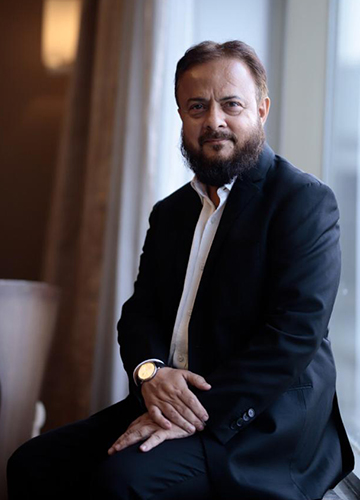Hindus and Muslims have been living together in India for more than 1,000 years. Islam reached India soon after it was born in Arabia. I have visited the first mosque in India, the Cheraman Juma Masjid in Kerala, which was built in the seventh century.
Growing up in the late 1970s and early 1980s, I never felt I was any different just because I was a Muslim. Most of my classmates were Hindus, Christians or Parsis. We used to visit each other’s houses and celebrate each other’s festivals. Today such social interaction has diminished, even though our Class of 1981 has a WhatsApp group.
I have been a practising Muslim since age 15 and have not missed even a single namaz in the last 43 years. Even when I am in an airplane, train or car, I do namaz. I visited 40 countries and all Indian states and Union Territories without skipping namaz.
I also visit churches and temples regularly. Whenever I go to Varanasi, I visit the Sankat Mochan temple. Sometimes the Mahant himself takes me to the temple. Once, when my wife and daughter accompanied me, we hired a boat just to watch the aarti on the Ganges.
There are many non-Muslims in my team that conduct entrepreneurial workshops for the underprivileged. I have gone with them to the Kamakhya temple in Guwahati, the Meenakshi temple in Madurai, the Rameswaram temple and Kashmir’s Bhavani temple, which gave me a mesmerising experience. Another spiritual journey was to the Golden Temple in Amritsar.
I lived in England for seven years. A neighbour of mine there was a priest, who took me to church regularly. While in Palestine and Israel, I went to all important churches as well as mosques. That is the way, I felt, I could learn about different cultures.
Urdu translations of the Ramayan and the Mahabharat are available at the madrassas I am associated with. Renowned poet Anwar Jalalpuri and his wife translated them to Urdu. Long ago I went to Jaipur to have a look at a Persian translation of the Ramayan. Christian scriptures are also there in our madrassas.
I tell students in madrassas to learn about Hinduism and Christianity, just as I tell my Hindu friends to read the Quran and study the life of the Prophet. If we respect each other’s religion, I believe many of our problems will disappear.
— As told to Anirudha Karindalam
—Sareshwala was chancellor of Maulana Azad National Urdu University.


